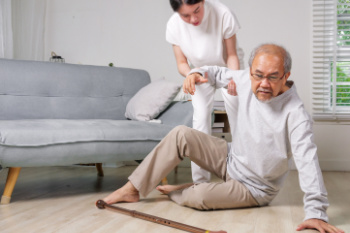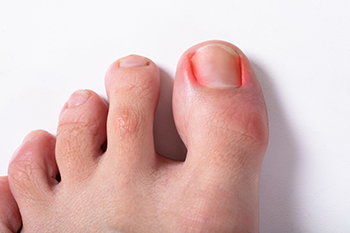Items filtered by date: April 2024
Mechanical and Neurologic Heel Pain
 Mechanical and neurologic heel pain are two distinct types of heel discomfort, each with unique causes and characteristics. Mechanical heel pain can be triggered by overuse of the lower limbs or from wearing improper footwear that does not provide enough support. One common condition resulting from these issues is plantar fasciitis, where the plantar fascia ligament running along the bottom of the foot becomes inflamed. Another cause of mechanical heel pain is Achilles tendonitis, which involves inflammation of the Achilles tendon at the back of the leg. On the other hand, neurologic heel pain stems from nerve-related issues, such as tarsal tunnel syndrome, where the nerve inside the tarsal tunnel of the ankle is compressed. Pinched nerves that cause sharp, shooting pain are also a cause of neurologic heel pain. Understanding the origin of heel pain is important to identifying the right treatment. Mechanical issues might be addressed with orthotics, stretches, and proper footwear, while neurologic pain may require interventions like nerve decompression or medication to manage pain and inflammation. If you are suffering from heel pain, it is suggested that you schedule an appointment with a podiatrist today.
Mechanical and neurologic heel pain are two distinct types of heel discomfort, each with unique causes and characteristics. Mechanical heel pain can be triggered by overuse of the lower limbs or from wearing improper footwear that does not provide enough support. One common condition resulting from these issues is plantar fasciitis, where the plantar fascia ligament running along the bottom of the foot becomes inflamed. Another cause of mechanical heel pain is Achilles tendonitis, which involves inflammation of the Achilles tendon at the back of the leg. On the other hand, neurologic heel pain stems from nerve-related issues, such as tarsal tunnel syndrome, where the nerve inside the tarsal tunnel of the ankle is compressed. Pinched nerves that cause sharp, shooting pain are also a cause of neurologic heel pain. Understanding the origin of heel pain is important to identifying the right treatment. Mechanical issues might be addressed with orthotics, stretches, and proper footwear, while neurologic pain may require interventions like nerve decompression or medication to manage pain and inflammation. If you are suffering from heel pain, it is suggested that you schedule an appointment with a podiatrist today.
Many people suffer from bouts of heel pain. For more information, contact Ramin Nadjafi, DPM of Advanced Podiatry Group. Our doctor can provide the care you need to keep you pain-free and on your feet.
Causes of Heel Pain
Heel pain is often associated with plantar fasciitis. The plantar fascia is a band of tissues that extends along the bottom of the foot. A rip or tear in this ligament can cause inflammation of the tissue.
Achilles tendonitis is another cause of heel pain. Inflammation of the Achilles tendon will cause pain from fractures and muscle tearing. Lack of flexibility is also another symptom.
Heel spurs are another cause of pain. When the tissues of the plantar fascia undergo a great deal of stress, it can lead to ligament separation from the heel bone, causing heel spurs.
Why Might Heel Pain Occur?
- Wearing ill-fitting shoes
- Wearing non-supportive shoes
- Weight change
- Excessive running
Treatments
Heel pain should be treated as soon as possible for immediate results. Keeping your feet in a stress-free environment will help. If you suffer from Achilles tendonitis or plantar fasciitis, applying ice will reduce the swelling. Stretching before an exercise like running will help the muscles. Using all these tips will help make heel pain a condition of the past.
If you have any questions please contact our office located in Orlando, FL . We offer the newest diagnostic and treatment technologies for all your foot and ankle needs.
Types and Causes of Foot Corns

Corns on the feet are small, yet bothersome, skin formations that can cause significant pain if left untreated. Foot corns, which are composed of layers of dead skin cells, typically appear as thick, circular, raised areas of skin. They commonly develop on, near, or between the toes, below the toenail bed, or on the sole of the feet. The three primary types of foot corns are hard corns, soft corns, and seed corns. Regardless of their type, foot corns can cause discomfort, pain, and a burning sensation, particularly when wearing shoes or walking barefoot. Foot corns develop from excessive pressure or friction on the foot. Causes include wearing tight or ill-fitting shoes, prolonged standing, and walking or running barefoot. It's a good idea to address foot corns promptly and effectively to prevent complications. A podiatrist can offer personalized treatment options, including professional corn removal techniques and recommendations for footwear modifications. If you are experiencing the discomfort of corns on the foot, it is suggested that you schedule an appointment with a podiatrist to determine the type of corn and its proper treatment.
If you have any concerns regarding your feet and ankles, contact Ramin Nadjafi, DPM of Advanced Podiatry Group. Our doctor will treat your foot and ankle needs.
Corns: What Are They? and How Do You Get Rid of Them?
Corns can be described as areas of the skin that have thickened to the point of becoming painful or irritating. They are often layers and layers of the skin that have become dry and rough, and are normally smaller than calluses.
Ways to Prevent Corns
There are many ways to get rid of painful corns such as wearing:
- Well-fitting socks
- Comfortable shoes that are not tight around your foot
- Shoes that offer support
Treating Corns
Treatment of corns involves removing the dead skin that has built up in the specific area of the foot. Consult with Our doctor to determine the best treatment option for your case of corns.
If you have any questions please feel free to contact our office located in Orlando, FL . We offer the newest diagnostic and treatment technologies for all your foot and ankle needs.
Risk Factors for Falling

As people age, the risk of a fall increases, but it should not be seen as inevitable. Falls can be caused by various factors, including weak muscles, poor balance, and dizziness. Foot problems like pain or deformities, and cognitive issues such as memory loss, and vision and hearing impairments, can also contribute to the risk of falls in seniors. Medications that induce drowsiness, excessive alcohol consumption, and certain bladder or bowel conditions can increase the likelihood of falling. Falls often result from an interaction of these factors, with a higher number of risk factors further elevating the potential for falls. In addition, falls can sometimes signal underlying health issues like constipation, infections, dehydration, or sudden confusion. A podiatrist can provide expert advice and interventions to address foot-related problems, improve balance, and reduce the risk of future falls. If instability causes you to lose your balance or fall frequently, it is suggested that you schedule an appointment with a podiatrist for a thorough exam and options for treatment.
Preventing falls among the elderly is very important. If you are older and have fallen or fear that you are prone to falling, consult with Ramin Nadjafi, DPM from Advanced Podiatry Group. Our doctor will assess your condition and provide you with quality advice and care.
Every 11 seconds, an elderly American is being treated in an emergency room for a fall related injury. Falls are the leading cause of head and hip injuries for those 65 and older. Due to decreases in strength, balance, senses, and lack of awareness, elderly persons are very susceptible to falling. Thankfully, there are a number of things older persons can do to prevent falls.
How to Prevent Falls
Some effective methods that older persons can do to prevent falls include:
- Enrolling in strength and balance exercise program to increase balance and strength
- Periodically having your sight and hearing checked
- Discuss any medications you have with a doctor to see if it increases the risk of falling
- Clearing the house of falling hazards and installing devices like grab bars and railings
- Utilizing a walker or cane
- Wearing shoes that provide good support and cushioning
- Talking to family members about falling and increasing awareness
Falling can be a traumatic and embarrassing experience for elderly persons; this can make them less willing to leave the house, and less willing to talk to someone about their fears of falling. Doing such things, however, will increase the likelihood of tripping or losing one’s balance. Knowing the causes of falling and how to prevent them is the best way to mitigate the risk of serious injury.
If you have any questions, please feel free to contact our office located in Orlando, FL . We offer the newest diagnostic and treatment technologies for all your foot care needs.
How Being Overweight Affects the Feet

Studies show that carrying extra weight puts a significant amount of pressure on the feet, leading to various issues. For instance, overweight individuals are more likely to experience general foot pain and especially discomfort in the bottom of the heels when walking. Additionally, their feet might appear flatter, and they may have difficulty moving them as freely as they should. This is because extra weight can alter the foot's mechanics, causing it to roll inward more during walking. Furthermore, it is important to note that it is not just about the overall weight but also where the body stores fat. Excess fat, particularly around the feet, can increase foot pain. A podiatrist can offer personalized strategies to alleviate discomfort and improve foot function. If you are experiencing foot problems that may be connected to your weight, it is suggested that you schedule an appointment with a podiatrist for help.
Obesity has become very problematic at this point in time and can have extremely negative effects on the feet. If you’re an obese individual and are concerned about your feet, contact Ramin Nadjafi, DPM from Advanced Podiatry Group. Our doctor can provide the care you need to keep you pain-free and on your feet.
Obesity and Your Feet
Since your feet are what support your entire weight when standing, any additional weight can result in pain and swelling. Being overweight is one of the main contributors to foot complications.
Problems & Complications
Extra Weight – Even putting on just a few extra pounds could create serious complications for your feet. As your weight increases, your balance and body will shift, creating new stresses on your feet. This uneven weight distribution can cause pain, even while doing the simplest tasks, such as walking.
Diabetes – People who are overweight are at serious risk of developing type-2 diabetes, which has a drastic impact on the health of your feet. As you get older, your diabetes might worsen, which could lead to loss of feeling in your feet, sores, and bruises. You could also become more prone to various infections.
Plantar fasciitis – Pressure and stress that is placed on muscles, joints, and tendons can trigger plantar fasciitis, which is an inflammation of tissue that forms along the bottom of the foot.
If you have any questions please feel free to contact our office located in Orlando, FL . We offer the newest diagnostic and treatment technologies for all your foot and ankle needs.
Heel Pain in the Morning?
Risk Factors for Ingrown Toenails
 Ingrown toenails, a common condition where the nail grows into the skin surrounding the toe, have a variety of risk factors. Trimming the toenails too short or rounding the edges of the nail can encourage the nail to grow into the skin rather than over it, so proper nail trimming is important. Wearing tight footwear and socks that squeeze the toes can also contribute to the problem by pushing the nail into the toe skin. Athletes and individuals who engage in activities that put repeated pressure on the toes are at an increased risk, as this pressure can cause the nail to grow incorrectly. While genetics do not usually play a major role in causing ingrown toenails, some people are predisposed to developing them because they are born with naturally curved or thick toenails. Also, poor foot hygiene and injury to the toenail area can increase the likelihood of developing an ingrown toenail. If you are suffering from an ingrown toenail, or wish to know how to prevent ingrown toenails from occurring in the future, it is suggested that you consult a podiatrist.
Ingrown toenails, a common condition where the nail grows into the skin surrounding the toe, have a variety of risk factors. Trimming the toenails too short or rounding the edges of the nail can encourage the nail to grow into the skin rather than over it, so proper nail trimming is important. Wearing tight footwear and socks that squeeze the toes can also contribute to the problem by pushing the nail into the toe skin. Athletes and individuals who engage in activities that put repeated pressure on the toes are at an increased risk, as this pressure can cause the nail to grow incorrectly. While genetics do not usually play a major role in causing ingrown toenails, some people are predisposed to developing them because they are born with naturally curved or thick toenails. Also, poor foot hygiene and injury to the toenail area can increase the likelihood of developing an ingrown toenail. If you are suffering from an ingrown toenail, or wish to know how to prevent ingrown toenails from occurring in the future, it is suggested that you consult a podiatrist.
Ingrown toenails may initially present themselves as a minor discomfort, but they may progress into an infection in the skin without proper treatment. For more information about ingrown toenails, contact Ramin Nadjafi, DPM of Advanced Podiatry Group. Our doctor can provide the care you need to keep you pain-free and on your feet.
Ingrown Toenails
Ingrown toenails are caused when the corner or side of a toenail grows into the soft flesh surrounding it. They often result in redness, swelling, pain, and in some cases, infection. This condition typically affects the big toe and may recur if it is not treated properly.
Causes
- Improper toenail trimming
- Genetics
- Improper shoe fitting
- Injury from pedicures or nail picking
- Abnormal gait
- Poor hygiene
You are more likely to develop an ingrown toenail if you are obese, have diabetes, arthritis, or have any fungal infection in your nails. Additionally, people who have foot or toe deformities are at a higher risk of developing an ingrown toenail.
Symptoms
Some symptoms of ingrown toenails are redness, swelling, and pain. In rare cases, there may be a yellowish drainage coming from the nail.
Treatment
Ignoring an ingrown toenail can have serious complications. Infections of the nail border can progress to a deeper soft-tissue infection, which can then turn into a bone infection. You should always speak with your podiatrist if you suspect you have an ingrown toenail, especially if you have diabetes or poor circulation.
If you have any questions, please feel free to contact our office located in Orlando, FL . We offer the newest diagnostic and treatment technologies for all your foot care needs.

